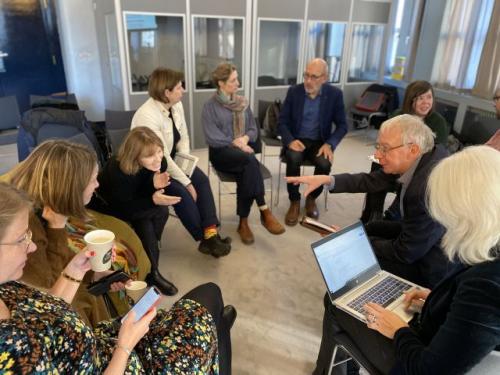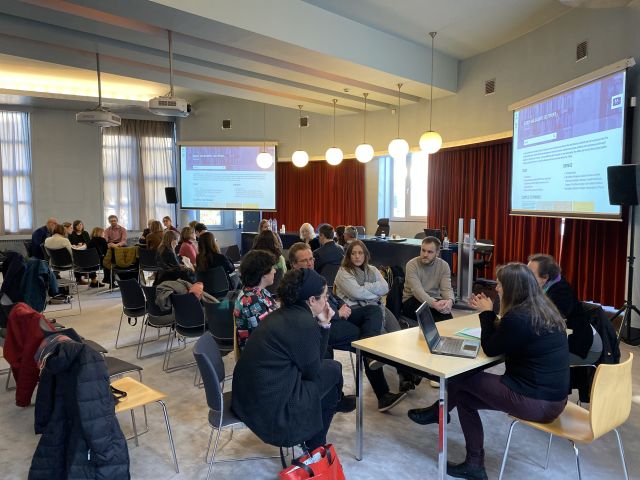EHRI-PP General Partner Meeting in Brussels | “EHRI Is a Complex Building”

On 13 and 14 December, all partners of EHRI-PP met for their semi-annual General Partner Meeting at the Belgian State Archives/CegeSoma in Brussels, the partner who had generously offered to host the event. EHRI-PP (European Holocaust Research Infrastructure – Preparatory Phase) is the EHRI-project concerned with preparing the research infrastructure for a permanent status in 2025, thereby securing the future of trans-national Holocaust research.
At this moment, many steps in terms of legal and financial work and developing research, user and technical strategies have already been taken. In May 2023, EHRI-PP will end and we can enter the implementation phase (IP). This will take us to the permanent status in the form of an ERIC (European Research Infrastructure Consortium) in 2025.
Collective duty
The Director-General of the Belgian State Archives (of which CegeSoma is a part), Prof. Karel Velle, honoured EHRI with his presence and opened the meeting. In his welcome, he confirmed the commitment of the State Archives and CegeSoma to EHRI and our collective duty not to forget the Holocaust. Next, the EHRI-PP Project Director, Dr. Reto Speck, reminded the participants that we are actually meeting in the same room where the very first EHRI General Partner Meeting took place in November 2010. He highlighted that EHRI should be proud of what it achieved in the intervening years, and thanked CegeSoma and the Belgian State Archives for their continued dedication to EHRI.
Governance
After these words of commitment and good memories, EHRI-PP’s progress on governance, statutes, legal and financial work was presented. It turned out that the future statutes of the EHRI-ERIC were approved by the Board of Governmental Representatives, a body in which committed countries are represented. Both the financial and legal work has reached its end stage and is about to be checked by experts before being finalized.
Thematic scope
User, access and training strategy and
Research and innovation strategy
A new development in user strategies is the setting up of an EHRI User Advisory Board, a relevant group of people who give feedback on any of the EHRI services. Within the research and innovation strategy, there is attention for EHRI’s future thematic scope, which is naturally the Holocaust, but not necessarily limited to it. Other genocides, other Nazi-crimes and research on antisemitism all may fit the scope of EHRI’s research themes. Technically, several measures are taken to secure the future of EHRI’s resources. A Data Management Plan, a living document, has been created and all our services can now also be found in the European Open Science Cloud (EOSC).
National nodes
A very important part of this Preparatory Phase of EHRI has been to get the future partners (now institutions, then countries) on board and commit to the ERIC. All current partner institutions have worked very hard to convince the relevant ministries in their countries to become a member of the EHRI-ERIC. So far, nine countries have already committed, and several others are almost ready to join. In practice, EHRI’s current partner institutions will usually set up and lead a so-called national node in their own countries, for example an EHRI-AT, an EHRI-CZ, EHRI-NL, or EHRI-UK. Representatives of these national nodes and of the ministries will be part of the future governance of EHRI-ERIC. An updated business and implementation plan is being prepared where all of this will be brought together in the next IP-phase.
Newcomers
After the plenary session, several workshops were organised to further the establishment of the national nodes and central hub. One workshop was dedicated to newcomers; representatives of countries that are not yet part of EHRI, such as Sweden, Croatia and Hungary, were welcomed and received an introduction into EHRI-ERIC. “EHRI is a complex building”, as Mgr. Michal Frankl explained.
Discussion Groups
The following day, requirements for national nodes’ websites were discussed. Soon, every country that will be part of the EHRI-ERIC will have its own EHRI website, with leads to the central website. National nodes will also organise their own activities. How to organise a national node and inspire relevant research, cultural or educational institutions to join was another topic of discussion groups.
Implementation Phase
The meetings were concluded by a workshop on the upcoming Implementation Phase of EHRI. This phase will take two years and have an organisation that is partly the same as before, but will also take on the characteristics of the ERIC. In the meantime, work will also continue in the EHRI-3 project, that had a management board meeting preceding the General Partner Meeting of EHRI-PP.
Longstanding connections
As always, the meetings were also a good occasion for people to catch up. Some institutions and participants have now been part of the projects since the beginning in 2010, while there were also new faces on the scene. Over the years, EHRI has formed longstanding connections between people and institutions and all the signs indicate that we are on a steady path to a permanent EHRI-ERIC.
Images ©CegeSoma. Thanks to Isabelle Ponteville and Adina Babeș-Fruchter

